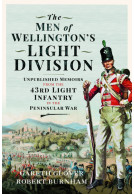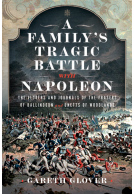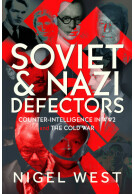Waterloo: The Defeat of Napoleon's Imperial Guard (Hardback)
Henry Clinton, the 2nd Division and the End of a 200-year Old Controversy
(click here for international delivery rates)
Order within the next 10 hours, 44 minutes to get your order processed the next working day!
Need a currency converter? Check XE.com for live rates
| Other formats available - Buy the Hardback and get the eBook for free! | Price |
|---|---|
| Waterloo: The Defeat of Napoleon's… ePub (13.5 MB) Add to Basket | £6.99 |
This is the most detailed account of the 2nd Division at Waterloo ever published. It is based on the papers of its commander Sir Henry Clinton and it reveals for the first time the previously unrecognised vital role this division made in the defeat of Napoleon.
They Swept the Field Clear explains how the division was placed ahead of the main allied squares thus impeding the charges of the French cavalry, and how the 2nd Division supported the defence of Hougoumont, considered by the Duke of Wellington as the key to his victory on 18 June 1815.
Perhaps the most significant aspect of this book is the description of the defeat of Napoleon's Imperial Guard. Just who and how the incomparable Guard was stopped and the driven from the battlefield is explained in detail. Once and for all, this 200-year controversy is finally resolved.
As featured in.
The Society for Army Historical Research 2015 Christmas Book List
The best book I have ever read on Waterloo.
Major Robert Burnham U.S Army Retired, Editor of the Napoleon Series Website
Sub-titled Henry Clinton, the 2nd Division and the End of a 200-year-old Controversy, this book draws on a mass of previously unpublished material regarding the exploits of the 3rd British Brigade and indeed the entire 2nd Division of Wellington’s army at Waterloo 1815. Under Lieutenant General Sir Henry Clinton GCB, the 2nd Division was a strong formation, with two of its three brigades German speaking. It was initially stationed in reserve behind the right of the Allied line and north of the Nivelles road, but was ordered forward to the front line in the early evening of the battle.
Stuart Asquith, Author
Commanded by Major General Adam, the 3rd British Brigade consisted of 1/71st (Highland) Light Infantry, 2/95th Rifles (part), 3/95th Rifles (part) and 1/52nd (Oxfordshire) Light Infantry.
As elements of Napoleon’s Imperial Guard assaulted the centre of the weakened Anglo-British line, the musket fire from the 52nd smashed into their flank, the French staggered and the 52nd charged home, routing the French column, which lost all semblance of order. Or so some historians would claim – but is it all true? Reading this book will tell you…
Waterloo: The Defeat of Napoleon's Imperial Guard is not a book for someone looking for an overview of Waterloo. It does a superb job of dissecting the controversy over whether it was Adam's Brigade or the Guard's Brigade that was instrumental in defeating the Imperial Guard. However, its real appeal is in its study of the General Clinton's 2nd Division during the Waterloo Campaign. Mr. Glover's detailed look at the internal workings of the division and the strengths and weaknesses of each of its battalions makes it a rare and welcomed addition to our knowledge of the British Army of the era. This in depth study of the nuts and bolts of a single division is without a doubt the best book I have ever read on Waterloo.
The Napoleon Series
This is the most detailed account of the 2nd Division at Waterloo ever published. ... [This book] reveals for the first time the previously unrecognised vital role this division made in the defeat of Napoleon.
Antiques Diary
As featured in
Essence Magazine
'The most detailed account of the 2nd Division at Waterloo ever published...'
Cardiff Times
About Gareth Glover
Gareth Glover is a former Royal Navy officer and military historian who has made a special study of the Napoleonic Wars for the last thirty years. In addition to writing many articles on aspects of the subject in magazines and journals, his books include From Corunna to Waterloo, Eyewitness to the Peninsular War and the Battle of Waterloo, An Eloquent Soldier, fourteen volumes of The Waterloo Archive, Waterloo: Myth and Reality, The Forgotten War Against Napoleon: Conflict in the Mediterranean 1793-1815, The Two Battles of Copenhagen 1801 and 1807: Britain and Denmark in the Napoleonic Wars and Marching, Fighting, Dying: Experiences of Soldiers in the Peninsular War.























